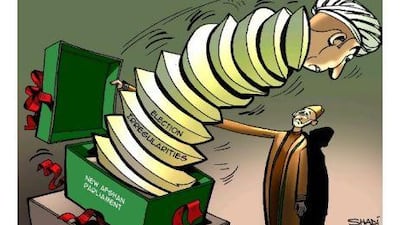The Arab street, it turns out, is no myth. And when it congregates, it is around themes and grievances that have universal meaning: a yearning for human dignity, social justice and political empowerment. From peoples that have been endlessly portrayed as uniquely prone at succumbing to extreme ideologies and falling for demagogues (and have done so at times), this is ample confirmation that they are driven by the same motives as people elsewhere.
One need not be a nihilist to realise that the sclerotic, underperforming Arab political order is in need of profound revamping. In fact, the conditions of such upheaval have been around for years, if not decades. The state of the three core Arab countries, Egypt, Iraq and Syria, once the region's cultural and economic engines, is nothing but sad. The Arab Human Development Report may sound like a tedious read but it is an essential one: it catalogues how societal and political factors converge to make the current status quo untenable.
The litany of Arab ills is not new. Populations are growing; many youth are unemployed, with 33 per cent of Egypt's youth staying at home; underemployment is hitting in particular the educated youth like Mohammed Bouazizi whose suicide awoke Tunisia; poverty is rising because robust growth has often created more inequality; nepotism, corruption and state repression have alienated citizens. Tunisia, Egypt, Algeria and Yemen also had in common upcoming successions that, had they gone the way their rulers wanted, would have consolidated and perpetuated the hold of narrow elites (as has successfully happened in Syria). The Arab social contract is simply fracturing.
What was the decisive factor that drove millions to the streets now? Don't turn to political analysts for answers; the switch is psychological when outrage at relentless assault on one's dignity and a sense of kafa (enough) merge. No one expected a million Lebanese to demonstrate for independence in 2005 and millions of Iranians to protest about the fraudulent 2009 elections. Quiescence, it seems, is no longer fashionable.
What is striking about events in Tunisia and Egypt is how irrelevant the West has been. Demonstrators there haven't taken to the streets because the West encourages them or enrages them. Grievances at home are fuelling the anger; western nations who have supported Arab autocracies have overlooked these complaints. But western nations not addressing them was never a central reason why these regimes existed and survived. Yet, the changing political landscape will not necessarily be to the West's liking. It is easier to deal with a strongman than a messy democracy, and it will be difficult to align strategic priorities (preserving the peace treaty with Israel) with the new realities that may emerge from today's struggle. The West and the US can still come out on the losing side if they bungle their message. France certainly realises this with its mishandling of the Tunisia uprising and it would be dishearteningly ironic if the US president Barack Obama's much-lauded Cairo speech were buried there.
Another conspicuous feature is the still relatively marginal role of Islamist movements. They serve as a convenient boogeyman because of their networks of mosque and their ideology, but their strength is routinely exaggerated, as is their radicalism. This is not to say that Islamist forces will play no role in either the transformation or government. The 1979 Iranian revolution was very much the doing of secular and leftist activists until better-organised and ideologically-driven Islamists took the lead and crushed them. Since then however, narrow Islamist ideology has proven unable to fulfil the demand for individual rights and dignity; it also suffers from its own contradictions and dismal record where it was implemented. This is why Islamist slogans have been so rarely heard on the streets of Cairo in the past few days.
Watching events in the Arab world with trepidation does not mean that much won't go awry. Transitions are extremely volatile, often chaotic and uncertain by nature. A bloodbath has been averted in Tunisia thanks to shrewd military manoeuvering. In Egypt, how the army behaves will be key. It can ease, block or hijack a transition. Political dissent, while overwhelmingly peaceful, still lacks leadership and direction. Then comes the question of reconciliation.
The ruling parties in Tunisia and Egypt have undoubtedly abused their power but just like the Baath in Iraq, they are part of the society's fabric. Creating a pluralistic order will have to entail a measure of goodwill and pragmatism.
The unrest is also a challenge to how Arab citizens envision their future. If they truly aspire to freedom and democracy, Tunisians, Egyptians and others need to do more than reject the ways of the past. They will have to coalesce around notions of individual liberty and responsibility, and rethink the role of the omnipresent, omnipotent state. They would do well to ponder over the intellectual legacy of Samir Kassir, the assassinated Palestinian-Lebanese writer who urged the Arab world to come to terms with modernity.
There is a warning to other states in this upheaval. Marwan Muasher, a former Jordanian foreign minister and leading reformist, rightly argues that moderation cannot just be limited to the realm of foreign policy. For too long Western-aligned Arab states have paid lip service to calls for reform and pointed to flattering rankings from international organisations to placate critics. Egypt's troubles show how untenable this deflection strategy is.
Emile Hokayem is former political editor of The National

